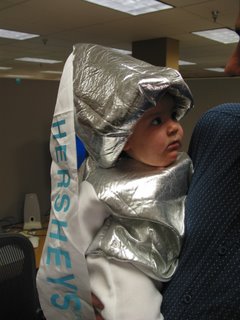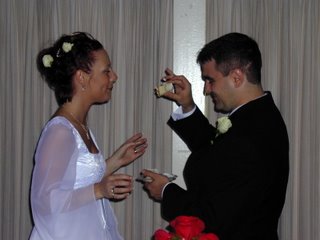My family has been stolen from me: my father, my mother, and both of my brothers. Gone, stolen. Never to be returned.
Were they murdered? In an accident or fire? No.
They were stolen from me by their own religion. The very religion I was raised to believe. But because I choose to follow a different path, they are REQUIRED to shun me. Or they will be expelled as I was.
I thought the greatest hope a parent could have for their child was happiness no matter what path they followed. Am I wrong? Why do I have to be someone I'm not for them to show me their love for me? I'm sorry, for them to be ALLOWED to show me the love they have for me? What kind of religion makes a parent treat their own flesh and blood with contempt? How healthy is that religion, really? Does that religion really follow the bible or Jesus?
But yet, they have "the truth", and I have turned my back on God, simply because I refuse to be a hypocrite and pretend to be something I'm not. I live in the now, instead of waiting to live my life in some mythical "paradise on earth" where everyone is the same. (Can you say "Stepford world"?)
It is my belief that each individual on this planet is unique, unlike anyone else. For those of you that believe that God created us, why do you insist that we all follow the same path? Why must we all believe what you believe? I don't get it.
I am a very unique person. So are you. I embrace you, why can't you embrace me? We come from the same place, don't we?
(Edited because some people can't see where my pain actually comes from. Actually, they can't see my pain at all.)
You claim you have the one, true religion. Really? Huh. Jesus said we would be able to recognize his followers by the "love they show". All I ever saw in the 28 years I was part of your religion was power-hungry assholes who put the appearance of righteousness above actual righteousness. Your religion has rules made by men (ie, not allowed to associate with those that have been expelled, not allowed to have beards or goatees, women aren't allowed to wear dresses or skirts above the knee, not allowed to critically examine your own religion but expect others to examine theirs so they can be converted, ..... I could go on and on and on and on and.....), something Jesus detested.
I quote from your very own bible:
Mark 7:6-8 He (Jesus) said to them: "Isaiah aptly prophesied about YOU hypocrites, as it is written, 'This people honor me with [their] lips, but their hearts are far removed from me. It is in vain that they keep worshiping me, because they teach as doctrines commands of men.' Letting go of the commandment of God, YOU hold fast the tradition of men."
One of the characteristics of a destructive religion is an enforced policy that requires the members to shun anyone who leaves or gets expelled from the religion. It is a common trait among esoteric movements that claim to be "the Truth." Members are required to sever association with even their own family members and relatives who leave. The consequences of this harsh doctrinal policy are extreme, shattering family relationships and leaving the victims emotionally and spiritually devastated.
Still don't believe me about the toxicity of your religion?
The scripture used to deny me entrance to my brother's wedding:
But now I am writing you to quit mixing in company with anyone called a brother that is a fornicator or a greedy person or an idolater or a reviler or a drunkard or an extortioner, not even eating with such a man....Remove the wicked [man] from among yourselves.--1.Cor. 5:11, 13 (NWT)
The text is clear that a person with whom the congregation should not mix company is one who is:
1) "called a brother" (that is, one who professes to be a member of the congregation); and
2) practicing fornication, greed, idolotry, reviling (insulting), habitual drunkeness, and/or extortion (theft).
- Jehovah's Witnesses do not disfellowship greedy persons.
- They often do not disfellowship people who regularly get drunk unless their conduct becomes so outrageous and publicly-known as to bring reproach upon Jehovah's Witnesses.
- They do not disfellowship people for many of the things which they themselves class as "idolatry" (for example: materialism, worshipping an organization, etc.).
- On the other hand, Jehovah's Witnesses do disfellowship and shun people for:
- no longer claiming to be called a brother/sister.
- independent study and discussion of the Bible that brings Watchtower doctrine into question.
- possession of literature written by former members.
- having lunch with a former member, even if the former member professes to be a Christian and was not disfellowshipped for fornication, greed, idolotry, reviling, drunkeness, or extortion.
- attending a service of any other church or religious organization.
- authorizing a blood transfusion, even to save the life of a child.
- numerous other actions not mentioned in scripture, but deemed by the congregation elders to be "unclean conduct," or "conduct unbecoming" of a Jehovah's Witness. "Conduct" in this case covers a broad range of actions not clearly defined by the Society, leaving discernment about what is not acceptable to the discretion of the congregation's elders. As a result, standards by which people may be disfellowshiped are inconsistent throughout this religion which claims "unity" to be one of their identifying characteristics.
"Not to be mixing in company with" . . . "not even eating with . . ."Here it is important to learn the customs of association for worship practiced by first-century Jews and Christians, bearing in mind that Jesus and the apostles were Jews. They lived according to the Jewish lifestyle and customs of their day. Jesus taught in the synogogues; hence, he was called "Rabbi." Matt.26:25; 26:49; Mark 9:5; 11:21; 14:25; John 1:38, 49; 3:2, 26; 4:31; 6:25; 9:2; 11:8
There were two kinds of association for religious worship:
1) public meetings, such as at the temple and in synogogues, which anyone was allowed to attend; and
2) private gatherings of the different sects.
Christians and Jews participated in both. Christians, met in private homes, usually over a special meal with prayer. A presiding minister hosted the meal using either fellowship funds or personal funds. (Acts 20:20; see the footnote in older editions of the NWT)
Christians were instructed to "greet" one another with a kiss. (Rom.16:16; 1.Cor.16:20; 2Cor.13:12; Ti.3:15; 1Pet.5:14) When Paul sent his "greetings" in a letter to the Christians in Thessalonica, he requested that the "brothers" be greeted by a "holy kiss" on his behalf. (1Thess.5:26)
It was by this sign that Judas betrayed Jesus. (Luke 22:47,48)
Clearly, Paul did instruct Christians to expel from the congregation's fellowship any person who was purposely practicing willful sin. The disassociation would quite naturally exclude them from being greeted by the identifying "holy kiss," as well as not being allowed to share in meetings and the meals for Christian worship and prayer. However, Paul's instruction did not prohibit normal conversation or witnessing to former members. Nor were they barred from attending worship in the temple or the synagogues. Jesus, the apostles and Paul, along with the rest of the Jews, worshipped God both publicly in the temple and synagogues, and privately with small groups in various homes. (Acts 5:42) It was from the private Christian fellowship for worship that sinners were excluded.
I refuse to associate myself with any religion that requires shunning. I will not be an arrogant hypocrite ever again.
My family was stolen from me over 8 years ago, and I miss them.

















































